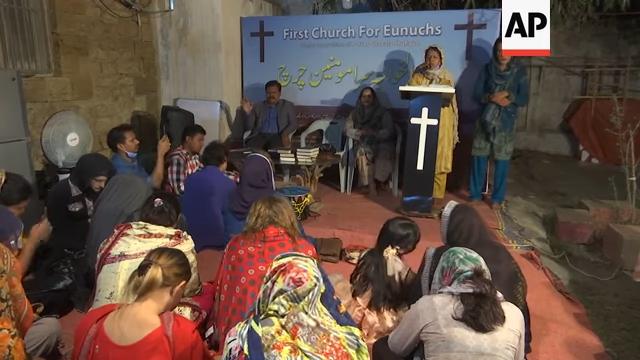 KARACHI, Pakistan — The first “church” for transgenders and those who identify as “neither” male or female has opened in Pakistan in order to provide a place of belonging for those whose lifestyles are not affirmed in biblically orthodox church settings. The Church of Pakistan will not support the gathering, citing that there are “theological issues” with the matter.
KARACHI, Pakistan — The first “church” for transgenders and those who identify as “neither” male or female has opened in Pakistan in order to provide a place of belonging for those whose lifestyles are not affirmed in biblically orthodox church settings. The Church of Pakistan will not support the gathering, citing that there are “theological issues” with the matter.
The “First Church for Eunuchs” is led by female “pastor” Ghazala Shafique, who outlined to the Associated Press that she chose the name, in part, because in the Bible eunuchs are accepted by God. In South Asia, eunuch is also reportedly a term used to refer to men who align more with women.
A paper published in 2019 by Faisal Shahzad Khan of Islamia College Peshawar, entitled “The Plight of Eunuchs in Pakistan,” explains that the word eunuch entails three categories: those born with deformed genetalia, those who are hermaphrodite or intersex, or “males who [have] undergone a castration, or any other medical procedure to align their physical sex with their brain sex.”
The BBC also defines eunuchs as “men castrated at an early age for medical or social reasons.”
“[A] eunuch is not a male, because they have an imperfect or missing male sex organ or they have no sexual desire for the opposite sex, i.e. females, or they carry a female name, walk and behave like females, [and/or] even they prefer to dress like them,” Khan asserts. “Similarly eunuch is not a female because, they do not possess female reproductive organs or they cannot conceive pregnancy.”
“Therefore they belong to a third category of sex, which is called the third sex.”
According to the Associated Press, men who present themselves as women — whether transgender or “third gender” — are often outcasts in Pakistan. The few who profess to be Christians are allegedly told to sit in the back of the Church assembly or not to comport themselves as ladies.
One transgender, identifed in the report only as Arsoo, said that he had difficulty finding a sure place to sit while attending a church where the men were on one side and the women on the other. Arsoo stated that he was told by the women to sit with the men, and the men told him to sit with the women.
“I found myself in such a confusing situation,” he told the outlet.
Shafique was approached by Neesha Rao, Pakistan’s first transgender lawyer, to start the assembly as he was concerned about churches not accepting transgenderism.
“I am a Muslim child and a Muslim transgender, but I had a pain in my heart for the Christian transgenders,” Rao stated.
The First Church for Eunuchs is held outside of Shafique’s home, and video footage posted online shows males who take on the appearance of females — among others, including children — in attendance as those gathered sing and play instruments.
A sign behind the podium also uses the term “khwaja siras,” which is Urdu verbiage for “gender non-conforming” and is considered more polite or politically correct than the sometimes used “hijra.”
“Though largely believed by society to be intersex people or hermaphrodites, the khawaja sira community actually consists of a variety of gender non-conforming persons assigned male at birth that share in common certain life ways. Being hijra is as much a cultural identity as it is a gender one,” writes the Pulitzer Center.
“Khawaja siras share a tenuous relationship with their social and physical landscape,” it explains, “[with] many interacting with the public as entertainers, beggars and sex workers, while also living in deras or residences headed by a guru.”
Pakistan formally began recognizing a “third gender” in 2009, paving the way for residents to obtain identification with simply an “X” rather than male or female. In 2018, parliament passed the Transgender Persons (Protection of Rights) Act. Biological men who prefer to dress like women also began running for political office.
“I was born with a very small male organ. Inside, my feelings are female,” a 35-year-old Pakistani identified as Zara told The Guardian in 2018. “I want to live like a woman, cook and do domestic work. … Our appearance is different, so why should we have to have ‘male’ on our identity card?”
Shafique says that she wants the Church of Pakistan denomination to provide official recognition to her gathering, but those efforts have been rejected.
“I asked the bishop of the Church of Pakistan. He said, ‘Oh, there are some theological issues,’” she outlined. “I am still waiting to hear what are those theological issues which cannot be resolved when they are accepted in the Bible.”
According to Bible commentaries, the term eunuch pertains not to crossdressers but to men who remain single and do not take a wife, whether because of physical circumstances (birth genital deformities or involuntary castration) or their personal desire to devote themselves fully to the service of the kingdom of God.
“There are some whom God by nature hath made unfit for marriage. There are others whom men (wickedly) make unfit for it, that they may gratify their own jealousy,” English theologian Matthew Poole once expounded on Matthew 19:12.
“And there are some who have made themselves eunuchs, not castrating themselves (that is wickedness), but abstaining from marriage and yet living chastely (having mortified their lusts and brought under their body) that they might be less encumbered with the cares of the world, and be more free for the work of the ministry, or be able more to give up themselves to a holy life and spiritual conversation.”
THE GOSPEL

As previously reported, while some view transgenderism and gender confusion as a medical condition, Christians believe the matter is also, at its root, a spiritual issue and a result of mankind’s fallen state.
The Bible teaches that all are born with the Adamic sin nature, having various inherent feelings and inclinations that are contrary to the law of God, and being utterly incapable of changing by themselves.
It is why Jesus came: to “save His people from their sins” (Matthew 1:21).
Scripture outlines that Jesus came to be the propitiation for men’s sins (1 John 2:2; 1 John 4:10), a doctrine in Christianity known as substitutionary atonement, and to save men from the wrath of God for their violations against His law (Romans 4:25, Romans 5:9, Romans 5:16), a doctrine known as justification.
The Bible also teaches about regeneration, as in addition to sparing guilty men from eternal punishment, Christ sent his Holy Spirit to make those who would repent and believe the gospel new creatures in the here and now, with new desires and an ability to do what is pleasing in the sight of God by His indwelling and empowerment (Ezekiel 11:19, 2 Corinthians 5:17, Titus 3:5).
Jesus said that men must be born again, and have their very nature transformed by the Spirit from being in Adam to being in Christ, or they cannot see the Kingdom of God (John 3:3-8).
Ezekiel 36:26-27 states of this inner rebirth, “A new heart also will I give you, and a new spirit will I put within you, and I will take away the stony heart out of your flesh, and I will give you a heart of flesh. And I will put My spirit within you and cause you to walk in My statutes, and ye shall keep My judgments and do them.”
Become a Christian News Network Supporter...


